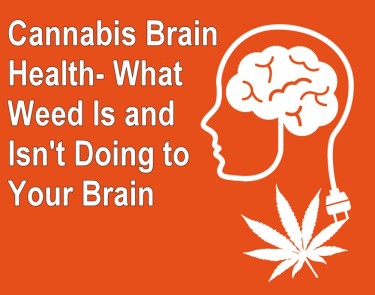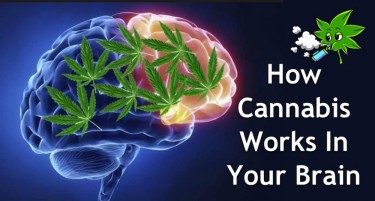
Can Cannabis Keep Your Brain Young?
The stereotypical weed smoker is portrayed as a slow fool who cannot have productive thoughts for more than a few seconds. They are motivated by their hedonistic tendencies and want to get “high” as much as possible.
In 2021, we know this is not the case, considering that nearly half of all adults in the US have tried cannabis at some point. While this harmful stereotype has been used to discourage people from smoking, on the assumption that “cannabis negatively affects the brain,” science sheds new light on the subject.
Like this PBS piece on whether cannabis reversed brain aging. The studies are currently being conducted in mice, which means there isn’t much human evidence that cannabis helps slow brain aging – but in mice the results have been consistent.
One theory is that as we age, we produce significantly fewer endocannabinoids. This affects our endocannabinoid system, which is responsible for maintaining homeostasis in the body. The endocannabinoid system helps modulate mood, pain, appetite, immune response, and much more.
Therefore, in theory, since many of our endocannabinoids are similar to the phytocannabinoids found in cannabis, we could see how it could compensate for the age-related loss of endocannabinoid production.
What did the mice tell us?
The current evidence for this idea comes from the study of mice carried out by several researchers. There are several studies in Israel, Germany and the USA. One of the researchers, Nicole Ashport, explained how they tested cognitive decline in mice in an established experiment;
“If we take young mice and put them in a learning and memory maze, they will learn very quickly to find the way out. Our old mice will also learn to escape the maze, but they just don’t learn as efficiently. A young mouse might need 16 attempts in the maze to master it. But it might take an old Maus 25. And so we can see that the old mice can still learn. They just don’t learn that fast. ”- Source
In this way, researchers can observe how long it takes for older mice to process the information and store it in memory. In theory, however, due to inflammation associated with aging, it could also be a lack of endocannabinoids reaching certain parts of the brain associated with memory.
However, when Ashport gave the mice low doses of THC, she observed something interesting:
“When we treated old animals with a synthetic version of THC in low doses, we saw a stimulatory effect. They would move faster, they would move more. They were able to solve the mazes more efficiently. This is in line with what was reported by the other groups that very low doses could produce a positive effect. “
We see this anecdotally in humans too. Many elderly patients have reported that they “feel alive” and “have more energy” after taking cannabis. Or, it could simply be due to an endocannabinoid deficiency, which led to increased inflammation – which is a cause or symptom of many different conditions.
One of the biggest hallmarks of aging, which can contribute to frailty and other impairments as we get older, is increased inflammation. Cannabis and many cannabinoids can reduce inflammation in the brain and throughout the body. Therefore, when we give cannabinoids, which act as anti-inflammatory signals, it is likely that they naturally improve the aging system by simply eliminating the stressors of inflammation. – Nicole Ashport
Good endocannabinoid health
Perhaps we are entering a phase of social life in which “cannabis use” becomes just as important as the use of vitamin supplements. The fact is, our endocannabinoid system plays a vital role in our health and wellbeing.
The endocannabinoid system is said to be fully developed by around the age of 25. By that point, your body will be producing a significant amount of endocannabinoids. Once it’s fully matured, endocannabinoid production drops significantly.
While you can get cannabinoids from many different foods and activities, the best source of cannabinoids in nature is cannabis. The whole plant provides a wide range of cannabinoids and terpenoids that interact with your internal organism at a very efficient rate.
If many of our age problems are caused by a lack of cannabinoids or an “endocannabinoid deficiency”, then consuming cannabis as a supplement makes sense.
However, some people are not interested in feeling “high” because they still have some prejudices about euphoria in medicine. However, cannabis doesn’t necessarily mean getting high. In fact, juicing raw cannabis should be more than enough to replenish your endocannabinoid system without the risk of getting high.
This is because the phytocannabinoids in raw cannabis are in their “acidic” state, which does not make them psychoactive. Given that non-psychoactive cannabis would also help replenish your endocannabinoid system, it should be obvious that one cannabis smoothie a day can keep age in check!
The sticky end result
We’ve been told repeatedly that cannabis is bad for your brain! Except now, in 2021, we find that this may be your last line of defense against spiritual decay in old age. Of course, this information is still in its infancy and as we move forward and advance global legalization, we will find out more about how cannabis interacts with our minds and bodies.
Meanwhile, early evidence suggests that cannabis could be a very effective drug for any condition that involves mental deterioration with age – this includes dementia, Alzheimer’s, and other neurocognitive diseases.
I know for a fact that I will continue to use cannabis well into old age. I may not always smoke it – but I will certainly use the raw plant in my smoothies every now and then just to make up for the loss of endocannabinoids that occur naturally with age.
YOUR BRAIN ON DRUGS, READ MORE …

What does cannabis do to your brain and what not to do?
OR..

HOW CANNABIS WORKS IN THE BRAIN, READ THIS!

Post a comment: